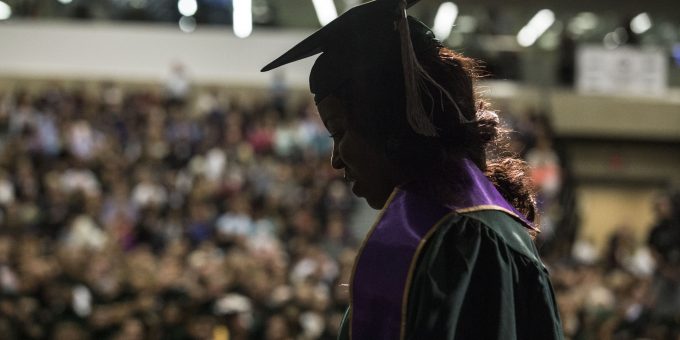
A College of DuPage student receives her diploma, May 2017. College of DuPage Newsroom, Flickr CC
Access Isn’t Enough
New York State’s groundbreaking tuition-free degree program will help thousands of middle- and lower-class families send their high school seniors to college. However, recent research in the Journal of Social Issues indicates that providing access to higher education isn’t enough to ensure their success.
Students from low socioeconomic backgrounds arrive at college with cultural experiences and emotional roadblocks over which they may stumble.
Researcher Mickaël Jury and his coauthors studied the experience of low-SES students in college and identified four key psychological barriers to success: emotional experiences, identity management, negative self-perception, and motivation. High-SES families that already include college graduates understand and equip their children with the skills they will need to navigate college academic and social culture. Sociologists from Pierre Bourdieu to Annette Lareau and beyond have noted that such high-SES families inherently promote and are familiar with the values of higher ed—achievement based on knowledge and independence rather than interdependence. But when students arrive on campus, those from low-SES backgrounds bring lower perceptions of their competency, experience greater emotional stress, and have higher drop-out rates and lower GPAs.
The authors suggest a number of strategies colleges and universities can implement to support all students while also addressing the needs of lower-SES students in their transitions to higher ed. Among their proposals: self-reflective activities helping students identify their strengths and personal values, thereby creating a positive identity and identifying emotional tools that can be utilized later on. Colleges, they write, should also organize student panels of juniors and seniors from diverse SES backgrounds, demonstrating to incoming freshman how other college students have capitalized on their background experiences and reinforcing that all life experience is valuable.
New York’s access-for-all initiative will open doors for many students who might not otherwise have the opportunity to obtain a college education. Now it is up to the institutions to support the students who walk through those doors.
